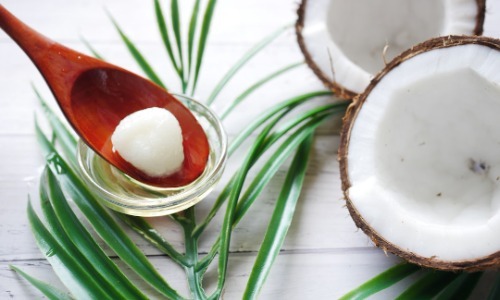
5 Natural Alternatives to Coconut Oil For Sensitive Skin
Coconut oil can be a great moisturizer for dry, flaky elbows and cracked heels, but it may be too heavy-handed for facial skin.
Additionally, coconut oil and its derivatives has the potential to clog pores, increasing the likelihood of breakouts. Fortunately, there are natural alternatives to coconut oil for sensitive skin that will nourish your complexion without the pore-clogging effects.
1. Aloe Vera
Aloe Vera is an incredible natural moisturizer that has the power to repair and rejuvenate skin. Packed full of antioxidants, it protects against aging and oxidative stress on the skin while its anti-inflammatory properties help reduce redness and irritation.
It is a succulent plant with pea-green leaves and thick gel-like sap that has been used for centuries to treat various skin conditions. Asphodelaceae (Liliaceae) family thrives in dry climates around the world. The gel from this plant is an abundant source of vitamins and minerals.

Aloe vera comes in many forms, such as tablets and capsules for oral consumption; creams, ointments, and lotions for topical application; powder to add to smoothies; and whole-leaf extract used in beverages.
Its powerful antioxidants fight free radicals while stimulating collagen production. It can strengthen your skin’s protective barrier to keep moisture in and help keep out environmental aggressors.
If your skin is sensitive, try using a natural cleanser that contains Aloe Vera. Alternatively, you can use a face mask made with the gel extracted from the plant to replenish its moisture levels.
Aloe vera can also be applied topically on damaged skin, eczema, and other chronic skin conditions that need healing. In fact, it’s often an ingredient in beauty products to reduce inflammation and soothe irritation.
2. Jojoba Oil
Jojoba oil is an effective moisturizer suitable for all skin types. It is naturally non-comedogenic and non-irritating, meaning it won’t clog your pores or make your skin dry. Furthermore, it contains antioxidants and other beneficial nutrients beneficial to skin health.
It’s also known as a skin-nourishing anti-inflammatory, since it helps relieve inflammation pain and promotes healing. Plus, it works to diminish wrinkles, fade fine lines, and brighten dull skin.
Jojoba oil works by mimicking sebum, the natural oils your body produces to moisturize and shield skin from external aggressors. Furthermore, it prevents your pores from producing too much excess oil which could clog them and lead to acne breakouts.
Jojoba oil is not only an excellent moisturizer, but it’s also an effective anti-inflammatory. It can be used to relieve skin inflammation caused by conditions like eczema or psoriasis.
Jojoba oil has a waxy consistency, making it ideal for sealing in moisture on skin and hair without leaving behind an irritating greasy feeling. Plus, its high amount of fatty acids – particularly linoleic acid and squalene – aid in cell regeneration and repair damaged skin cells.
Jojoba oil also offers the important benefit of Vitamin E, an antioxidant which protects skin from free radical damage. Furthermore, it stimulates collagen production – essential in delaying signs of aging such as wrinkles and age spots.
If your skin is sensitive, consider using jojoba oil instead of coconut oil as a moisturizer. It’s an effective moisturizer that can be used on all types of skin types and combined with essential oils for additional benefits. However, it is important to do a patch test before applying the product directly onto your skin.
3. Sweet Almond Oil
Sweet almond oil is not only a great cleanser, but it also soothes skin and prevents irritation. It contains anti-inflammatory fatty acids like oleic acid and linoleic acid which help to calm any inflammation that may be occurring on your skin.
Sweet almond oil also offers the added benefit of protecting skin from UV radiation damage. Not only does it prevent initial sun-damage, but it can also slow down its effects – particularly beneficial if you are at greater risk for developing premature signs of ageing. It has long been known to repair sun-damage. Almond oil contains antioxidants which can prevent further harm and restore skin elasticity.
For optimal results, use it as a daily moisturizer, especially if your skin is dry. After showering, pat a small amount onto skin and allow it to absorb.
Sweet almond oil not only soothes skin, but it is a natural moisturizer as well. This helps promote smoother, younger-looking skin by strengthening the barrier on top of it which keeps out irritants and prevents moisture loss.
Although sweet almond oil offers numerous benefits for sensitive skin, it is recommended that you do a patch test prior to application. Doing this helps guarantee you aren’t allergic, which could result in serious damage if you already have an existing nut allergy.
4. Grapeseed Oil
This cold-pressed oil has not been heated or distilled, making it more active and less likely to lose its anti-inflammatory, antioxidant, and antimicrobial properties. Grapeseed oil can be found in many skincare and hair care products. It’s a lightweight oil that absorbs quickly into your skin without clogging pores.

It contains antioxidants which fight environmental damage like UV rays and pollution, helping reduce wrinkles, dryness, and uneven skin tone. The oil is an ideal choice for acne-prone skin as it helps regulate sebum production and doesn’t clog pores. Furthermore, its antimicrobial and anti-inflammatory properties help control breakouts and reduce redness.
Linoleic acid, an omega-6 fatty acid, helps replenish skin moisture and keeps it from becoming dehydrated or itchy. Furthermore, this supplement contains vitamin E – an effective antioxidant which may protect against free radical damage caused by sun exposure or other environmental elements.
Grapeseed oil has a high concentration of antioxidants, such as vitamins C and E, that help combat free radical damage caused by sunlight, pollution, and other elements. Not only that but it can boost collagen and minimize the appearance of fine lines and wrinkles; additionally, it may minimize dark circles under the eyes while improving skin elasticity.
Sensitive skin will find this treatment to be a great choice as it has minimal side effects and is safe for most skin types. However, before using it on an extensive part of your body or face, always perform a patch test on a small area first.
5. Sunflower Oil
Sunflowers are beloved for their cheerful blooms, but they also contain plenty of nutrients that have been used as natural skincare ingredients for centuries. This oil contains fatty acids, vitamins and antioxidants which promote youthful-looking skin while providing essential hydration.
Sunflower oil is an ideal emollient, providing long-lasting moisture to dry and sensitive skin. Its linoleic acid helps retain water within the skin’s layers to restore a healthy barrier and make it less dry. It also has the benefit of soothing skin, particularly when it’s prone to redness and inflammation. The vitamin E present in this oil helps minimize skin redness, reduce sensitivity and eliminate itchy patches.
It can also shield your skin from environmental toxins and photoaging. This is because vitamin E contains antioxidants which shield skin from UV rays, protecting it against aging, wrinkles and dark spots.

Coconut oil can be drying for some, while sunflower oil offers a nourishing option for all skin types. It is non-comedogenic so it won’t clog your pores. Plus it helps to clear them by loosening accumulated bacteria, dirt, makeup and dead skin cells.
Sunflower oil, in addition to linoleic acid, contains antioxidants that can help keep your skin looking and feeling young. It’s a safe, gentle ingredient that can be added into any skincare regimen for numerous benefits.
Unrefined sunflower oil can be purchased in most grocery stores, health food stores and online. For optimal results, opt for organic cold-pressed sunflower oil that has not been chemically altered.
Want more alternatives to coconut oil? Check out part two for 5 more suggestions. If you’re looking for specific products, check out our coconut-free facial oil recommendations.




